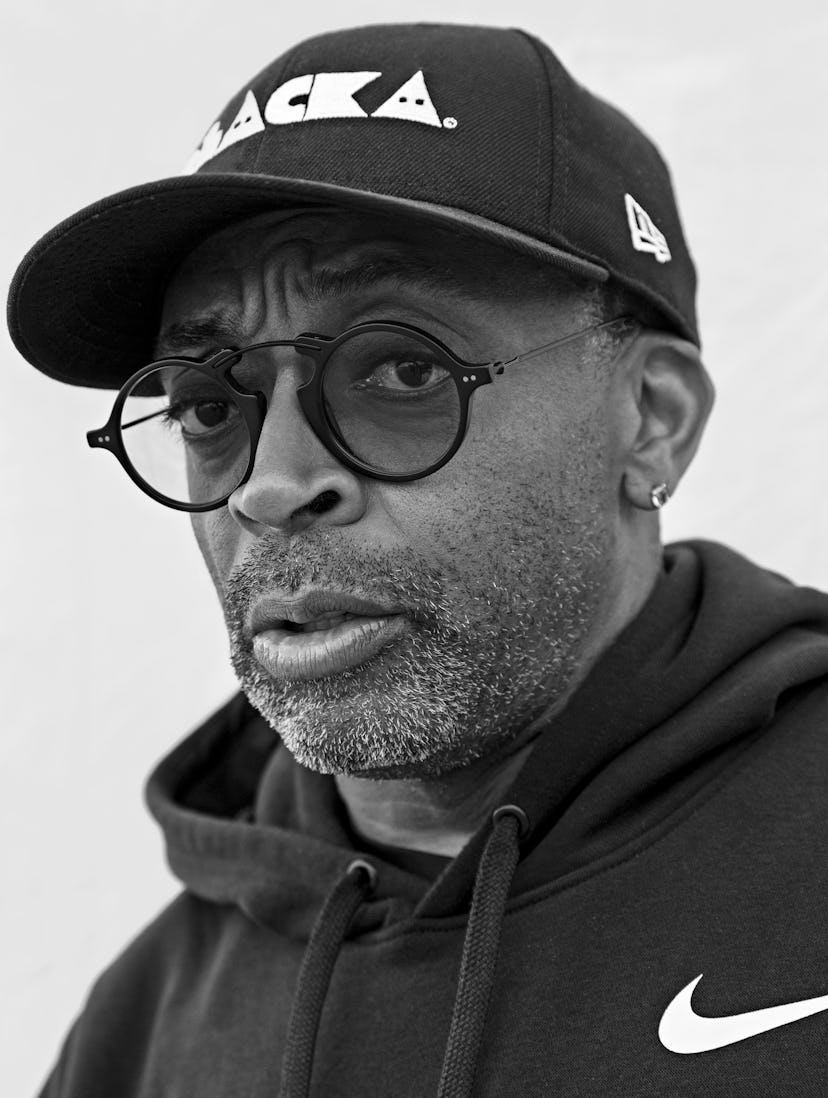Spike Lee on What’s Funny and What’s Definitely Not About BlacKkKlansman, His Cannes Grand Prize Winning Film
Cannes jury president Cate Blanchett says the film is “quintessentially about an American crisis.”

“I’m just going to grab this rosé here and take a seat,” said Spike Lee, as he daintily picked up a glass of wine and posed for photos. “Isn’t this what we do in the South of France?” The director has been the talk of the Cannes Film Festival, where his new film BlacKkKlansmen premiered this week. Set in Colorado Springs in the 1970s, the film tells the true-ish story of detective Ron Stallworth (John David Washington), who along with his partner Flip Zimmerman (Adam Driver), infiltrate and expose the atrocities of the Ku Klux Klan. The film, which is produced by Jordan Peele and also stars Laura Harrier and Topher Grace as a smarmy David Duke, received a six-minute standing ovation on Monday, which might have something to do with how relevant the film feels to today (a connection Lee makes very obvious in the final frames, by cutting to footage of the horrific events in Charlottesville, Virginia, when counterprotesters clashed with a white power rally and led to a vehicle attack that killed Heather Heyer). And on Saturday, the Cannes jury gave it their Grand Prix, the second-highest honor at the festival, with Cannes jury president Cate Blanchett saying the film is “quintessentially about an American crisis.” Here, Lee and his co-writer Kevin Wilmot talk everything from Trump to casting Denzel Washington’s son, John, as the lead.
Your film opened to a standing ovation… what do you think that says?
Spike Lee: I think people are responding to the subject matter and the world we live in today.
Kevin Wilmot: From the very beginning, Spike really wanted to connect to present events and present times we’re living in. We didn’t think of it as a period place. We wanted to be Brechtian, take the past and show its connection to the present reality. Unfortunately, we didn’t have to work very hard at that. Our reality today really connects to the reality the movie explores.
As hateful as some of the characters act, the film is also very funny. How did you want to use humor in this movie?
Lee: We did it very carefully. [Laughs.] It’s like pixie dust, we sprinkled it in. This is not the first film in history that has used humor with very serious subject matter.
Wilmot: In the original Spike and I had with Jordan Peele, the only note he really gave us was, “make it funny.” But what that means though, is that that really goes with being serious. The more serious you are, the more the humor comes from an organic place. You’re not telling jokes or trying to be funny. The humor comes from the absurdity and honesty of hate.
Lee: The kind of humor we’re doing is not comedy. People use this word comedy, and conflate humor and comedy. That’s not what we’re doing.
Wilmot: There’s a very different thing between humor and comedy. No one’s slipping on banana peels. By being dead serious and totally dramatic, we reveal the absurdity. You don’t try to be funny. You just reveal what’s crazy and absurd about this, then the humor organically comes to the surface.
How do you use love in Trump’s America, which is so full of hate?
Lee: I think when the president had a defining moment, and could have stood for love instead of hate, he didn’t do it. it was a conscious effort not to denounce hate and those terrorist groups, like the KKK, the alt-right, and the Neo-Nazis. He embraced hate instead of love. He gave those terrorist groups a stamp of approval. They were like we got a guy in there, we’re golden.
Were you writing the film when Charlottesville happened?
Lee: No, we were in post-production editing. David Duke and Trump wrote the ending of the film for us.
Wilmot: You can’t make this stuff up. There is a scene at the end where Ron (Washington) and Patrice (Harrier) are at Ron’s apartment. There is a knock at the door, and they’re alarmed and get your guns and go down this hallway together, where there is a window at the end, and they see a burning cross. And the idea of the cross was to show that this problem just keeps going.
Where did you first hear about the story of Ron Stallworth?
Lee: From Jordan Peele.
What about it struck a chord?
Lee: We wanted to know if it was true. A young black man becomes the first person to infiltrate the Ku Klux Klan—that’s all we needed!
Wilmot: If you could make that believable, you got a movie.
As co-writers, was there ever anything you two disagreed on?
Lee: We were simpatico all the way because we knew what we had to do. We had the road map to get it done.
When writing this did you have the cast in mind?
Lee: I knew I wanted John Davis Washington. I met him before he was born!